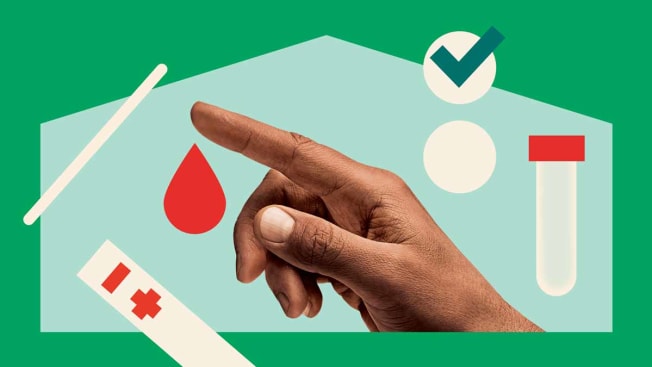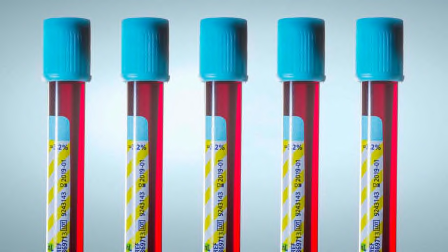The Truth About Home Medical Tests
Some might not be reliable. Here are the ones to use and the ones to avoid.

At-home tests for detecting COVID- 19 have certainly been in the news recently. In late December, with the omicron variant of the coronavirus spreading quickly, the White House announced that the administration would buy 500 million rapid-result COVID-19 tests, and that, starting in January, Americans could have tests delivered to their home—at no cost. A few states and communities were already offering such tests for free.
The COVID-19 tests are only one of the many types of available home medical tests, where users generally collect a “sample”— typically blood, urine, saliva, or mucus— and get immediate results or send it to a lab the test manufacturer designates.
Home Medical Tests to Try
The Food and Drug Administration has authorized the marketing of 100 or so categories of home medical tests. Some have been reviewed by the FDA to make sure, for instance, that they can accurately and reliably measure what the manufacturer claims the test measures. Others may be exempt from review, in some cases because the agency considers them low-risk. (To find the list of authorized tests, go to fda.gov, search for “in vitro diagnostics,” then click on Home Use Tests at left.) Some companies tout their products as “FDA registered,” but that doesn’t mean the FDA has reviewed them.
The most useful home medical tests may be those that help people with chronic conditions such as diabetes, congestive heart failure, and high blood pressure monitor their health, says Sterling Ransone, MD, president of the American Academy of Family Physicians. Home checks of measures like blood pressure can help people manage some conditions at home, saving them a trip to the doctor.
The FDA has also greenlit a handful of products for diagnosing issues such as urinary tract infections and vaginal yeast infections. And the Centers for Disease Control and Prevention now recommends that people consider using a rapid self-test for COVID-19 before joining gatherings with people outside their household.
If you have mild, straightforward symptoms, your doctor may be able to use home test results to treat you via phone or computer. “The combination of home testing and telemedicine has given us another way to take care of our patients,” Ransone says. “I call it the house call of the 21st century.”
Also useful is an FDA-approved home test for HIV, key for people without access to a healthcare provider or who are concerned about privacy. And with your doctor’s okay, you can use a home fecal test to screen for colon cancer or a small blood sample to screen for hepatitis C.
Be Wary of These Drawbacks
Tests that the FDA hasn’t okayed can have several drawbacks, our experts say.
Lax regulation: The FDA generally doesn’t review what it considers “wellness” tests. These are used to measure criteria such as hormone levels, food sensitivities, general heart health, blood levels of vitamins, stress, and cell aging; they tend not to diagnose specific conditions.
In addition, the agency typically does not check “laboratory developed tests” (LDTs), which are developed and used by a single lab. But the FDA has been paying attention to LDTs and in a 2018 statement identified potential problems, such as claims not supported by evidence, erroneous results, and faked data.
Some home testing companies, like Everlywell, say on their website that their tests are LDTs. Unsure? If the FDA has reviewed a test, that fact is likely to be included in the company’s marketing materials, says Kathy Talkington, director of health programs for the nonprofit Pew Charitable Trusts.
Shaky evidence: Certain top-selling tests are purported to identify food sensitivities by checking a user’s blood sample for IgG, an immune system antibody. But the American Academy of Allergy, Asthma, & Immunology advises against this because evidence linking IgG levels to food sensitivities and allergies is lacking. The FDA has also warned about home genetic tests that manufacturers claim will predict how your body would respond to antidepressants, heart drugs, and other medications.
Results with little use: Home tests for male, female, and thyroid hormones are plenty popular. But knowing your hormone levels doesn’t necessarily pinpoint why you feel, say, unusually tired. Numerous health issues, including anemia, depression, infections, and sleep apnea, can all cause fatigue, Kullgren says.
OTC genetic tests that screen for risk of Alzheimer’s disease, cancer, and other serious conditions are particularly concerning, says George Abraham, MD, president of the American College of Physicians. They can’t tell you whether you will develop a disease or give advice other than to follow existing health guidelines. “It just leads to unnecessary worry and anxiety,” he says.
Keep Your Doctor in the Loop
In general, our experts recommend consulting your doctor before using a home medical test. Some manufacturers make healthcare professionals available to recommend tests, counsel users, and even prescribe medications. But they can have a vested interest in the testing company they work for, Kullgren says. They also lack the full scope of information about you and your medical history. And factors such as your age and the medications you take can affect a home test’s results.
A doctor who is familiar with you is likely to have a fuller understanding of how to identify what’s amiss than a single home medical test can: “It’s like looking at a photograph,” Ransone says. “If you are just looking at one pixel, it’s hard to understand the whole picture.”
Before You Buy a Home Medical Test
Determine whether the test is authorized to be marketed by the Food and Drug Administration. For tests you send out, check the label or description to make sure the lab is “CAP accredited” or “CLIA certified.” This means that the test meets quality standards and that the lab undergoes regular inspections.
Ask your doctor if home testing is the best way to get the information you want. “There might be an alternative approach that could help you more effectively and quickly get to the bottom of what you are experiencing,” says Jeffrey Kullgren, MD. Plus, tests your doctor orders are typically covered by insurance; most of those you can buy yourself are not.
Check storage directions and the expiration date. Some tests are sensitive to temperature and humidity.
Follow instructions. Factors such as time of day, food and drink consumed, and supplements you take can affect results. Many test providers have tutorials or trained personnel to guide you.
Know that no test is perfect. COVID-19 tests that provide immediate results are generally less sensitive than those you send to a lab, and home tests for a urinary tract infection can’t detect less common types of bacteria.
And remember to talk with your healthcare provider about results and next steps.
Editor’s Note: A version of this article appeared in the February 2022 issue of Consumer Reports On Health.




